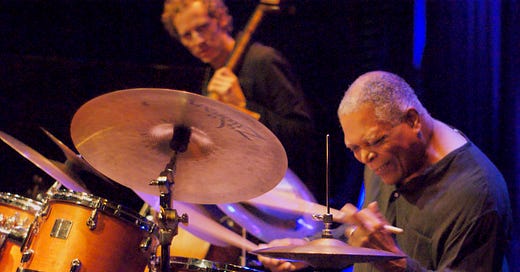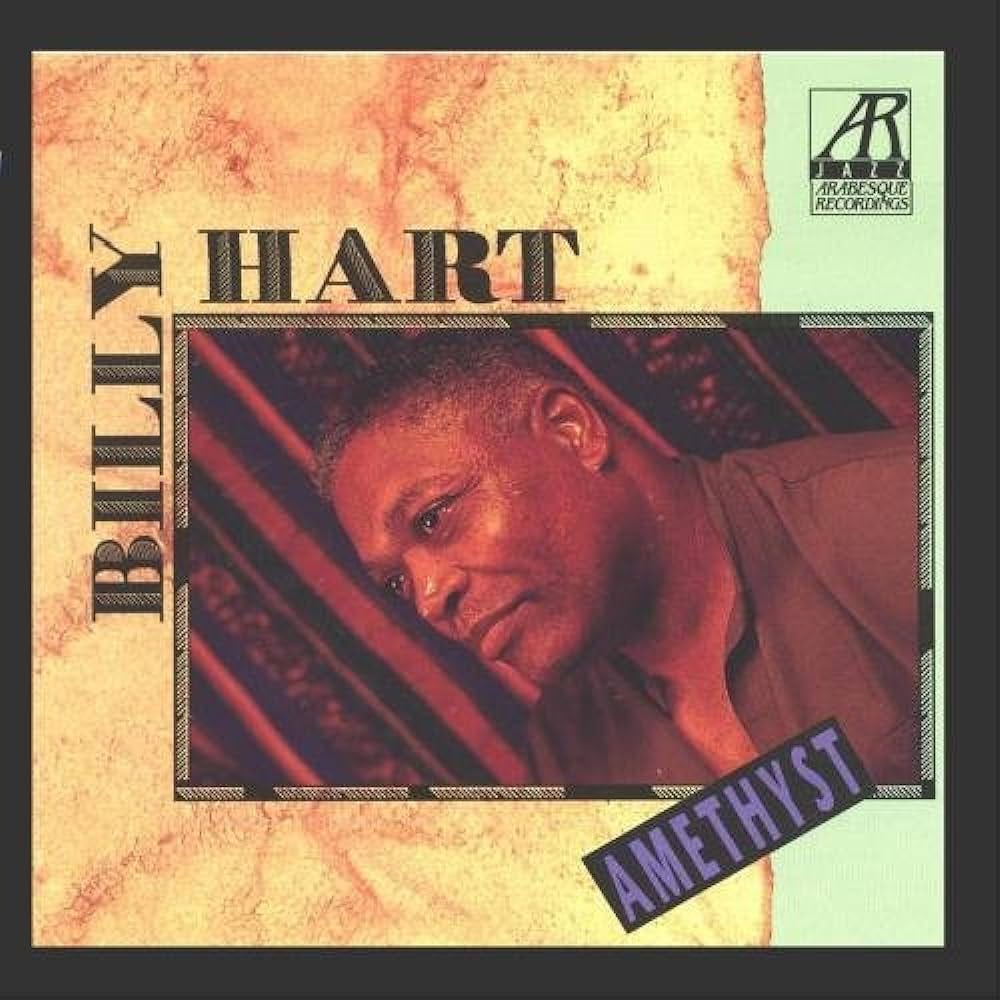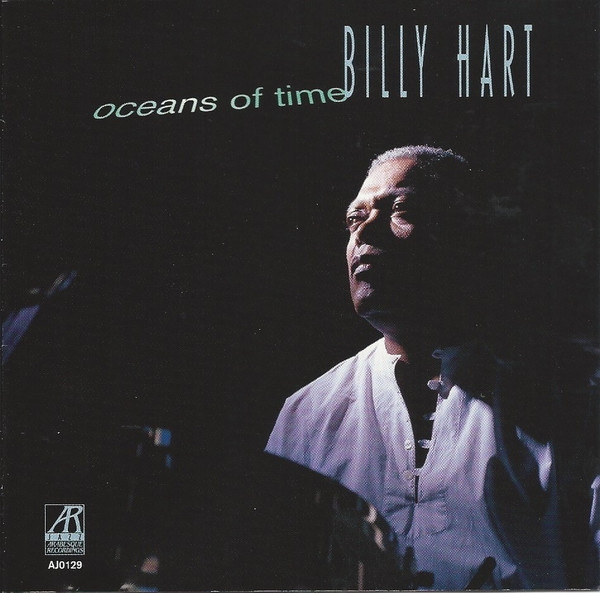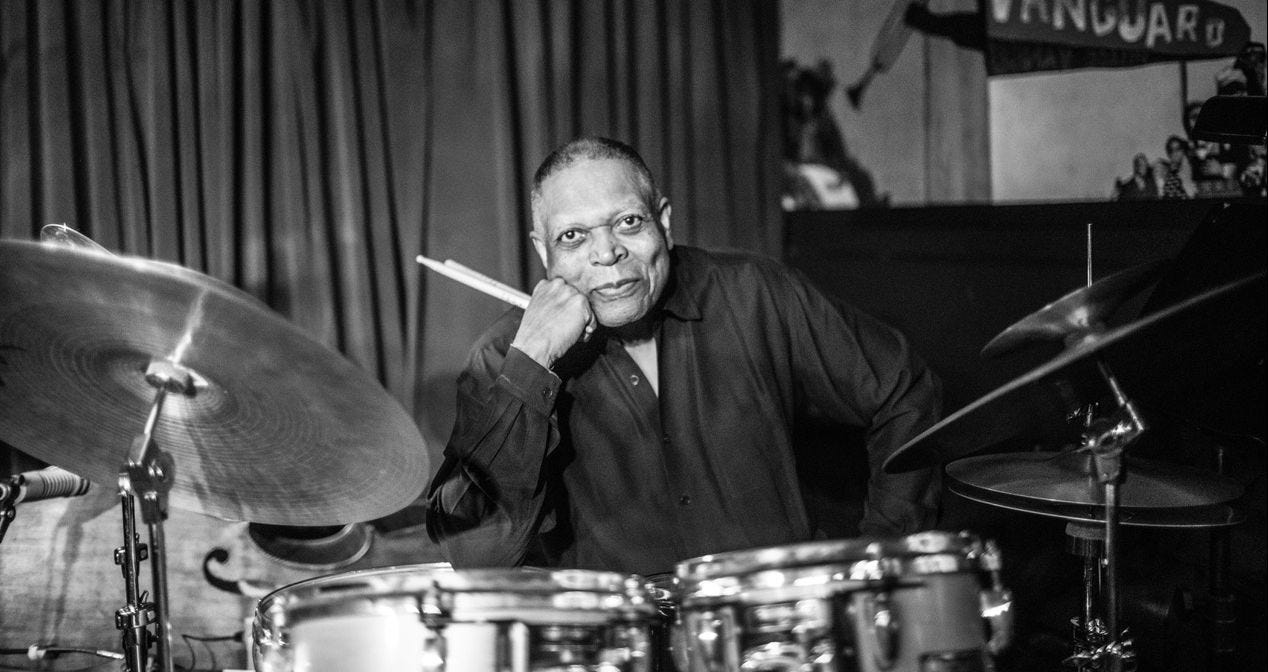I’m looking for magic, not realism. Or, at a minimum, some magical realism. Music has always been my mind-altering drug of choice. Albums are gateways to a higher realm—not a workout on the treadmill.
In 1992, drummer Billy Hart formed what was intended to be a working band. Known simply as the Billy Hart Band or Billy Hart Sextet (or Septet), the group gigged mostly in and around NYC. Thankfully, they recorded two albums for Arabesque Records: 1993’s Amethyst and 1997’s Oceans of Time.
We’re so lucky to have these documents: they most certainly are gateways to a higher realm. Oceans of Time, in particular, stands out; I’ll take the risk and call it a masterpiece.
Built on Billy Hart’s gift for bringing together players from disparate scenes and finding common ground, the two records are Hart’s lean on the mix of high and low (or sacred and profane, or European and African, or whatever your preferred duality ) common to all great jazz.
Here’s Billy’s comments:
When Daniel Chriss asked me to record for Arabesque, I looked for musicians that might actually be able to go on the road…… John Stubblefield was a soulful tenor player but also a proficient arranger and composer. He was from Arkansas, and his heart was in the blues. Stubblefield was also a member of the AACM, at least for a time, and I was attached to the idea of someone like that in my band.
At the opposite end of the spectrum, Mark Feldman was a rhapsodic violinist who loved European classical music….Dave Kikoski is a more obvious choice, his talent speaks for itself, and at that point he had been playing with Roy Haynes for several years…Santi Debriano is from Panama and has a lyrical and modern conception…Chris [Potter] was already a star at a very young age….
The same basic line-up is on both Amethyst and Oceans of Time, and together they may be my most forceful statement as a leader, where I was calling all the shots and writing a lot of music. As with all my albums up to this point, it was a diverse cast of people who may have never played together otherwise.
More Billy comments can be read here. Let’s get to these records:
Billy Hart: Amethyst (Arabesque, released 1993). Mark Feldman, violin; John Stubblefield, tenor sax; Dave Fiuczynski, guitar; Marc Copland, synthesizer; Dave Kikoski, piano; Santi Debriano, bass; Billy Hart, drums. Produced by Marc Copland.
Amethyst is streaming on YouTube on Billy’s channel, and here’s the link.
“Amethyst” (Billy Hart). The winding, evocative melody is played by the front line of tenor, guitar, and violin— a signature Billy Hart band sound. Stubblefield and Fiuczynski enter after solos from bass and piano, worlds collide and intertwine.
“King of Harts” (Stubblefield). My favorite melody on the record— Billy is a romantic at heart. His quasi-samba is dense, driving, but always flexible. Who but Billy could change gears so smoothly between John Stubblefield’s cracked blues, Dave Kikoski’s badass modernism, and Mark Feldman’s new-music expansiveness?
“El Junque” (Debriano). In the Ellington tradition of portraits, this is Debriano’s evocation of the El Yunque National Forest in Puerto Rico. Billy’s timpani mallets and Fiuczynski’s solo are almost the meeting place of modern jazz and prog rock.
“Melanos” (Fiuczynski). The Dave Kikoski/Billy Hart duo at the start of the track is great— Kikoski is convincing in every setting. After the melody, Stubblefield and the rhythm section get down to some churchy business, and then Fiuczynski cleans up. I love rock gestures in a jazz environment, every time. My adolescent soul is set aflame by distorted guitar with swinging drums.
It’s worth overemphasizing: Billy modulates nothing about his sound, approach, personality, or vocabulary to accommodate the changing musical environment, yet everything he plays fits with what’s going on. I’m aware of new dimensions of Hart’s mastery and genius by studying these records.
“Irah” (Billy Hart). Like “Duchess” from Oshumare, “Irah” is often played by the Billy Hart Quartet as an intimate medium swinger. Here, it’s a journey from Kikoski’s classic piano solo to the noir-like Feldman/Fiuczynski solos. The fade out on the rock coda is right on; I wish more jazz records featured those cinematic touches.
“Asylum” (Mark Feldman). The contrapuntal bass line and melody is simple enough, but has no obvious idiomatic reference— perfect for Billy Hart. After a Stubblefield moment and brief improv, the track culminates in a great Billy solo, with some of his signature phrases, including the 12/8 snare/floor tom/bass drum pattern that he used to open Herbie Hancock’s Crossing (Warner Bros, 1972).
“Dirty Dogs” (Kikoski). Billy’s non-specific Latin feel, almost an unabashed rock and roll backbeat, sets up Stubblefield’s most exciting touchdown of a solo on the album. We’re pleasantly close to fusion, even more so once Fiuczynski opens up. Billy Hart is abstract AND direct; rocking AND swinging. I think this is the mantra of modern music: give me both!
Oceans of Time, recorded in 1996, is Billy Hart’s magnum opus. It’s maximal and sprawling— not one track is less than seven minutes. Parts are hot modern straight-ahead, parts are Seventies-style free jazz, there’s cinematic Dave Douglas/John Zorn avant-garde, and Dave Fiucyznski plays the blues.
Somehow, it all fits together, and is one of the best records of the era. Billy saw where the music was heading, and got there right away.
I can’t be objective about the record. I heard Oceans of Time as a college student, and though I didn’t understand it— was, in fact, totally baffled by it— I got the message: Billy Hart is special. It spurred me to make a study of Billy, going to as many of his gigs as possible and collecting his records.
In the 2020-21 pre-vax lockdown, Oceans of Time was a lifeline, pure human communication that kept me going.
Dear reader, if you’re moved to check out anything from these two monster posts, open your mind, take a seat, carve out 72 minutes, and take a voyage on the Oceans of Time. It’s streaming on Billy’s YouTube channel.
Billy Hart: Oceans Of Time (Arabesque, released 1997). Mark Feldman, violin; John Stubblefield, tenor saxophone; Chris Potter, tenor and soprano saxophone, bass clarinet; Dave Fiuczynski, guitar; Dave Kikoski, piano; Santi Debriano, bass; Billy Hart, drums. Produced by Dave Ballou.
“One For Carter”. (Stubblefield). The snare/cymbal crashes on beat 1, and three slow beats later, it crashes on 1 again, followed by a 3-2 rumba clave: Billy Hart is telling us what we need to know. Dig how he keeps the life-celebrating Latin feel at almost-boil for nearly 7 minutes of fiery solos yet never grabs the spotlight, never plays flashy, even during his solo.
“Teule’s Redemption”. (Hart). An out-of-time minor melody gathers steam and becomes a fiercely swinging post-Coltrane burner. The slow build is such a simple idea, but hard to pull off; the band is confident and the performance so natural that there’s only one possibility: this was a working band.
Jazz musicians— fight to keep your groups intact.
“Shadow” (Dave Kikoski). A complex but melodic straight-eighth theme, with varied phrase lengths and many bars of 6/4. This is Billy the ultramodernist; his palette behind the solos sounds like early Marcus Gilmore.
“Oceans Of Time” (Hart). Fiuczynski plays the swinging theme before it morphs into a simple, almost taunting chant. Billy solos over the chant (11 bars), much Max Roach wisdom and vocabulary on the cusp of the 21st century. Billy’s bebop during Kikoski’s solo exposes the deep knowledge undergirding everything.
“Tosh” (Potter). A melodic, cinematic, and very memorable Potter theme, in a straight 3/4. The detailed arrangement and contrasting voices suggests Henry Threadgill’s You Know The Number, Tim Berne’s Sanctified Dreams, and probably a host of other things about which I should learn.
“Mindreader” (Debriano). A setting for Billy to play some open duos and trios. Fiuczynski’s answer at 0:22 is hilarious and perfect. Duo with Kikoski, then trio with Potter and Stubblefield, duo with Santi, and finally a great open Billy Hart solo. His toms are tuned so resonantly that we hear pitched melodies, like a marimba. I bet this tune really stretched on the gig. Anyone have a live tape of this band?
“Father Demo Square” (Feldman). One of Feldman’s more often-heard tunes— I like a version with him, John Taylor and Tom Rainey on ECM. Sort of amazing that these huge personalities— Fiuczynski, Potter, Feldman, Stubblefield— come through just as clear on Feldman’s detailed ballad as on the burners. Gotta love Billy’s cymbal playing during the piano solo.
“Offering” (Debriano). Back where we started, with the Billy Hart open eighth-note. Stubblefield, Fiuczynski, and Debriano are total individuals and aspects of an overall group sound— the bebop ideal. Fittingly, the album ends with a drum solo, a celebration: Billy’s knowledge, passion, humility, humor, and humanity come through loud and clear.
Billy was interested in keeping the Oceans of Time band going, but it wasn’t to be. However, in 2004, a one-off Ethan Iverson Quartet with Ethan, Billy, bassist Ben Street, and saxophonist Mark Turner, assembled for a week at the Vanguard, morphed into a new group, the Billy Hart Quartet,
This was Billy’s re-emergence as a bandleader, his most long-running and widely-loved group. The BHQ play often in NYC, tour frequently, and have made three (one for High Note, two for ECM) well-known and rightly loved records.
Iverson, Turner, and Street showcase every side of Billy— straight ahead master, Seventies jazz pantheist, Eighties consolidator, Nineties visionary, Two Thousands elder statesmen.
Deepest respect and all thanks. I believe in Billy’s vision of a unified music field. Let’s see if we can make it happen.








Interesting to note that both of the 90s recordings are produced by musicians (Marc Copland and Dave Ballou respectively). This is music that challenges both the musicians and the listener––we are so blessed to be able to listen to such creativity! Kudos again to you, Vinnie, for your perceptive writing!
Speaking of Billy Hart's current band...
Ben Street is the not-so-secret sauce in that group...
Really enjoying your writing and am always adding stuff to the listening list after reading your essays...